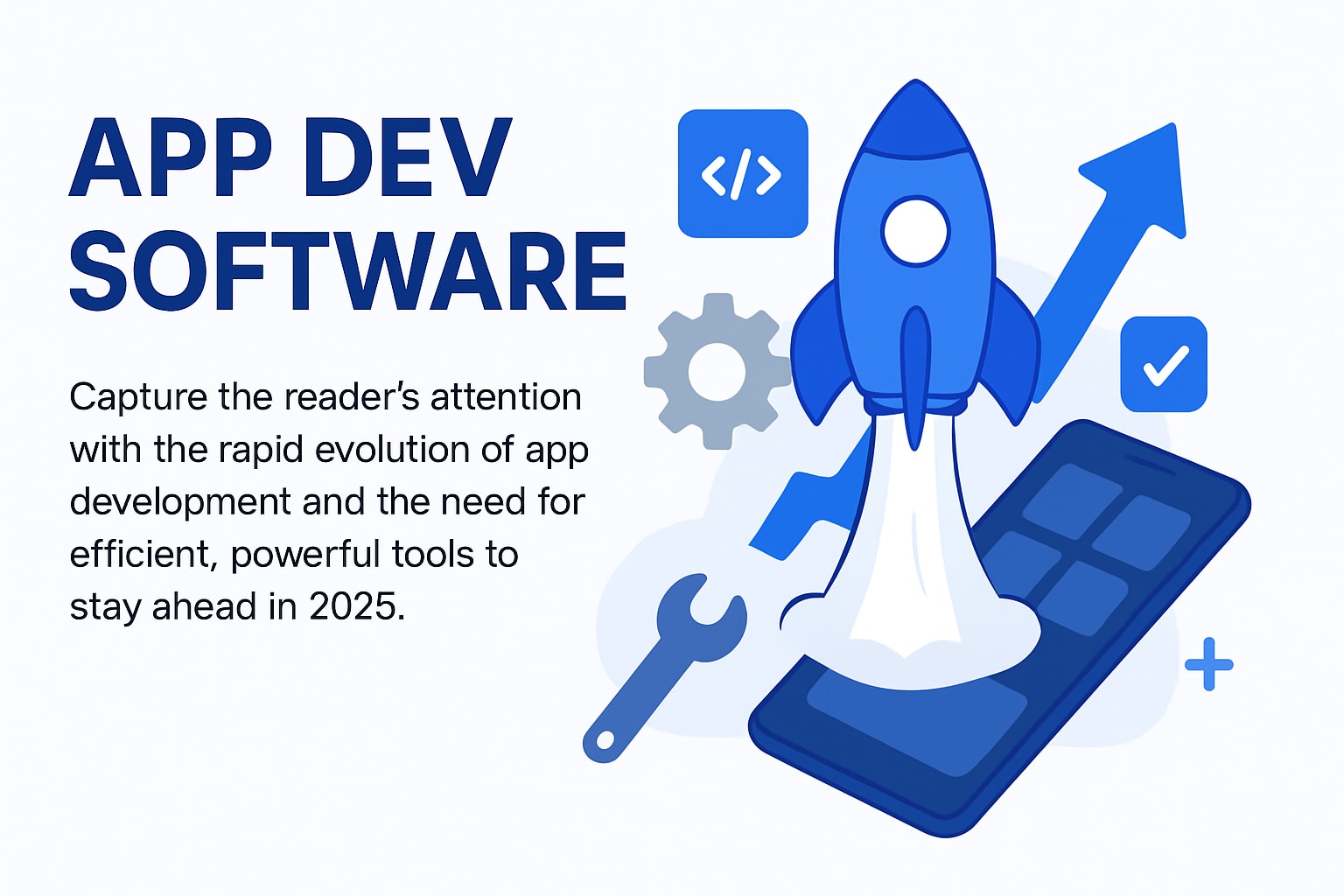App dev software is evolving at lightning speed, and staying ahead in 2025 means using the right tools to keep your projects competitive. Whether you are building your first app or managing a large-scale enterprise project, choosing the right app dev software can transform your workflow. In this article, we spotlight the top 10 solutions—ranging from no-code platforms to advanced IDEs and AI-powered tools—that can help you boost productivity, improve quality, and accelerate delivery. Discover which app dev software will help you achieve your goals and lead your team to success.
The State of App Development Software in 2025
The pace of change in app dev software is nothing short of remarkable. In 2025, developers and businesses face an ecosystem where innovation is constant, and the pressure to deliver high-quality applications quickly is higher than ever. Whether you're a startup founder or part of a large enterprise, understanding the current state of app dev software is essential to staying competitive.
The Evolution of App Dev Software
App dev software has evolved rapidly to address the changing needs of modern teams. Traditional coding environments are now complemented by low-code and no-code platforms, making it easier for people with varying skill levels to participate in development. Advanced IDEs have integrated AI to assist with code generation, error detection, and workflow automation.
Remote work and distributed teams have pushed collaboration features to the forefront. Real-time editing, cloud-based version control, and seamless integration with communication tools are now standard in leading app dev software. This shift ensures that teams can work together effectively, regardless of location.
Major Trends Driving Change
Several major trends are shaping app dev software in 2025:
- AI Integration: Tools now leverage AI for code suggestions, automated testing, and intelligent debugging, streamlining the entire development lifecycle.
- Low-Code/No-Code Solutions: Platforms like Bubble and Appian empower non-developers to build complex apps, reducing bottlenecks and accelerating delivery.
- Cloud-Native Development: With over 90% of businesses using cloud technologies, cloud-native app dev software is crucial for scalability and flexibility.
- Cross-Platform Capabilities: The demand for apps that run seamlessly across web, mobile, and desktop has made cross-platform development tools a necessity.
- Enhanced Security and Compliance: As data privacy regulations grow stricter, app dev software now offers built-in compliance checks and advanced security features.
These trends cater to both startups needing rapid prototyping and enterprises requiring robust, scalable solutions. Platforms like Studio Creatio integrate AI-powered automation, while Appian focuses on workflow orchestration for complex business needs.
The Growing Market for App Dev Software
The market for app dev software is expanding at an unprecedented rate. According to industry reports, the global application development software market is projected to soar, with low-code and no-code platforms playing a significant role. In fact, low-code and no-code platforms propel citizen developers to accelerate application development with reduced costs, opening the door for more people to contribute to software projects.
Statistics show a year-over-year increase in low-code/no-code adoption, with enterprises and small businesses alike embracing these solutions for their speed and cost-effectiveness. The demand for rapid deployment and iterative development is higher than ever, pushing vendors to innovate and deliver more powerful app dev software.
Why Selecting the Right Tool Matters
Selecting the right app dev software is a strategic decision that can make or break your project. The right tool can dramatically cut development time, streamline collaboration, and ensure your app is secure and scalable from day one.
Teams must assess their unique needs, from project complexity to compliance requirements, before choosing a solution. As automation and AI continue to reshape the industry, those who leverage the best app dev software will enjoy a clear advantage in productivity, quality, and speed to market.
How to Choose the Right App Development Tool
Selecting the best app dev software can make or break your project’s success in 2025. With so many options out there, how do you narrow it down to the tool that fits your needs? Let’s break down the decision process into manageable steps to help you choose wisely.
Assess Your Project and Team Needs
Start by evaluating your project’s size, complexity, and timeline. Are you building a simple MVP or a robust enterprise solution? Consider your team’s expertise—do you have seasoned developers, or are you working with non-technical founders? The right app dev software should match your team’s skill set and your project’s technical requirements.
Scalability is crucial. If you anticipate rapid growth, look for platforms that can handle increased users and features smoothly. Integration needs also matter, especially if your app must connect with third-party services or legacy systems.
Identify Core Features for Productivity
Every app dev software offers a unique mix of features. Key elements to look for include drag and drop builders for rapid prototyping, intuitive code editors, and real-time collaboration tools. Version control and deployment options are essential for managing updates and scaling efficiently.
A user-friendly experience is also vital. If your team includes non-developers, prioritize platforms with low learning curves and clear onboarding resources. The easier it is to get started, the faster your team can deliver results.
Evaluate Support, Documentation, and Community
Strong support can be a lifesaver when you hit a snag. Quality app dev software comes with comprehensive documentation, active forums, and responsive customer service. A vibrant community means you can find answers, share ideas, and keep up with best practices.
Before committing, browse help centers, tutorial videos, and case studies. This will give you a feel for the level of assistance available if challenges arise.
Consider Costs, Security, and Compliance
Budget is always a factor. Compare free plans, premium subscriptions, and any hidden fees. Some platforms charge per user, while others use flat rates or tiered packages. Weigh these costs against the value and features offered.
Security and compliance are non-negotiable, especially in regulated industries. Ensure your chosen app dev software supports data privacy, encryption, and industry standards relevant to your field.
Real-World Example: Fast MVP Launch with No-Code
Imagine a startup with tight deadlines and limited technical staff. By choosing a no-code platform, they launched their MVP in weeks instead of months, saving both time and money. If you’re considering this route, check out this guide on choosing the right no-code platform for your business.
Match Tools to Your Goals
Ultimately, the right app dev software should align with your business objectives, budget, and team strengths. Test a few options with pilot projects before making a final decision. This approach ensures you select a platform that boosts productivity and sets your project up for long-term success.
Top 10 App Dev Software Tools to Boost Your Projects in 2025
Staying ahead in 2025 means having the right app dev software in your toolkit. The market is full of innovative solutions, but which ones truly stand out? Here are the ten best app dev software platforms, each offering unique features for faster, smarter, and more scalable development.
Big House Technologies
Big House Technologies is redefining app dev software for 2025 with its flexible, full-service approach. Pricing ranges from Basic to Enterprise plans, with custom quotes to fit any organization. At its core, Big House leverages no-code solutions like Bubble, integrates AI, and uses UI/UX design tools such as Figma. End-to-end product lifecycle management and robust QA/testing are standard.
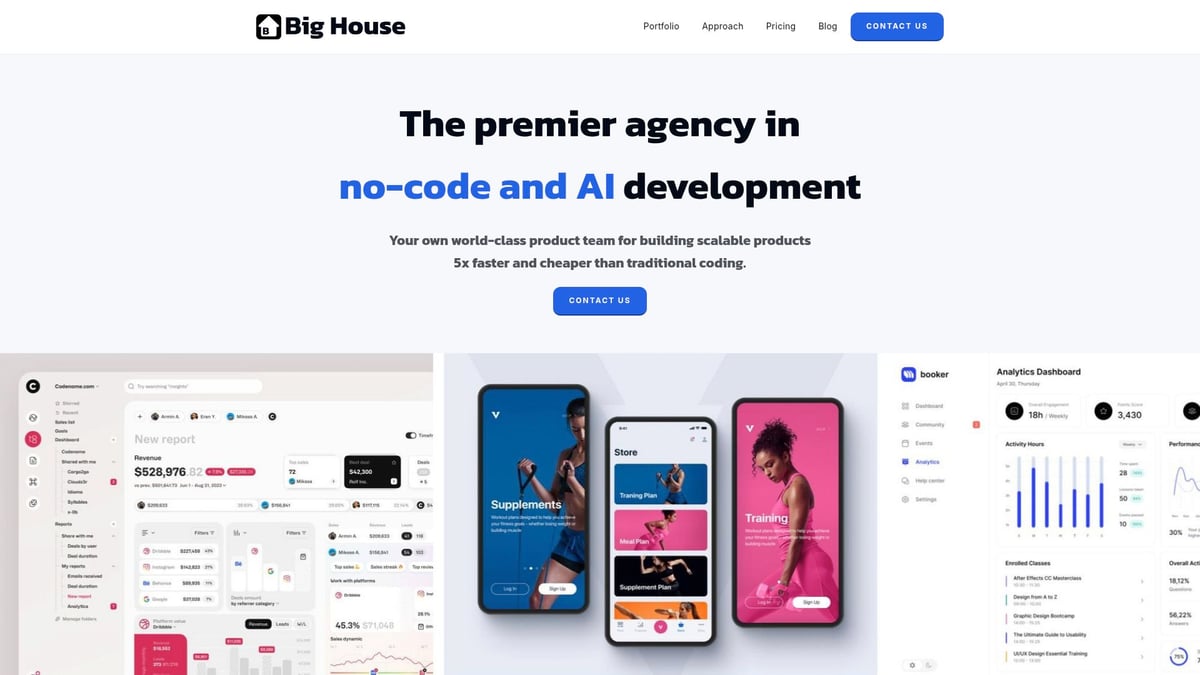
What sets this app dev software apart is the ability to build applications up to five times faster while saving costs by up to four times. It’s scalable for both startups and enterprises, and the client collaboration features are designed for transparency at every stage.
Big House is ideal for startups, SMEs, large enterprises, non-technical founders, and regulated industries. Pros include rapid development, cost savings, and proven results. Cons: it’s focused on no-code and AI, so traditional coders may look elsewhere.
A recent client shared how their MVP launched in just weeks, not months, reducing both timeline and budget. For teams seeking a deeper dive into why no-code solutions for faster development are game-changers, Big House is leading the way in modern app dev software.
Appian
Appian stands out in the app dev software landscape for its enterprise-grade low-code automation and powerful workflow orchestration. Its pricing is custom, with a free plan available for smaller deployments.
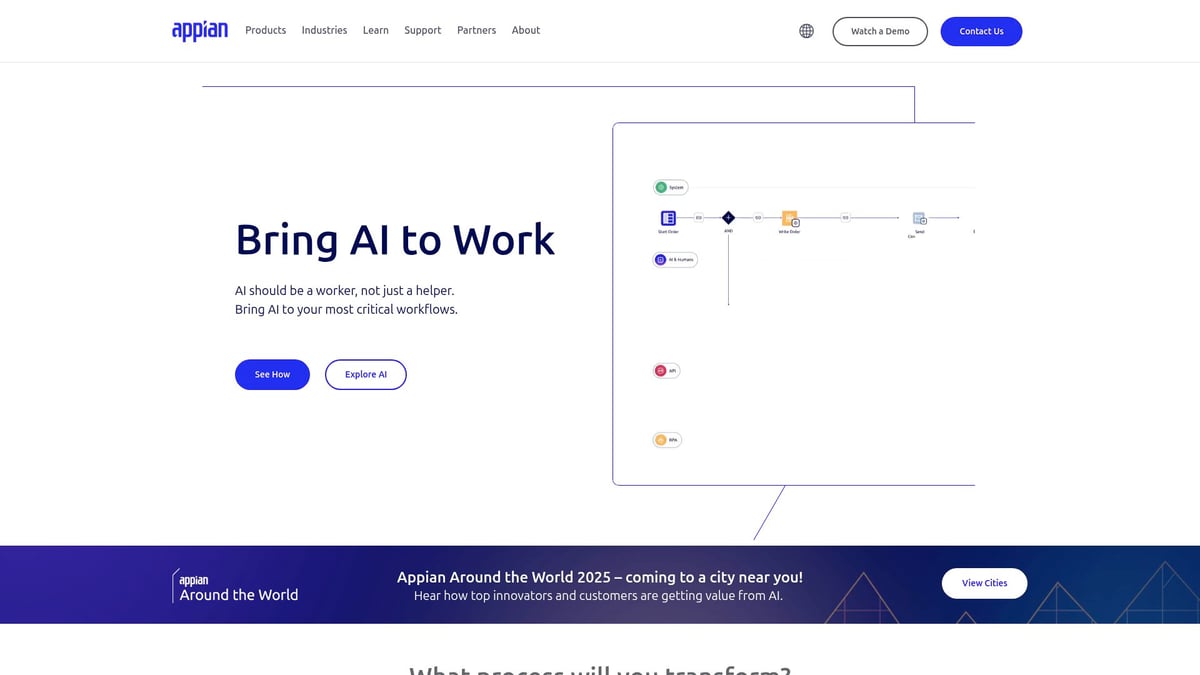
Core features include low-code process modeling, AI/ML integration, and robust security. Appian excels in speeding up delivery of complex business apps while ensuring compliance for regulated industries. Its strengths are most visible in large organizations needing to automate intricate processes.
The main benefits: accelerated delivery, support for complex business logic, and top-tier compliance. Pros are its scalability and powerful automation, while cons include a steeper learning curve for advanced features and premium pricing for large-scale use.
A global enterprise recently used Appian to automate legacy processes, slashing project timelines and increasing digital transformation speed. For teams aiming for efficient, compliant app dev software, Appian is a top contender.
Android Studio
Android Studio remains a cornerstone in app dev software for mobile teams targeting Android. It’s completely free, making it accessible for indie developers, startups, and educational institutions alike.

As the official IDE for Android, it features a powerful code editor, emulator, performance profilers, and seamless integration with Firebase. These tools allow developers to build, test, and deploy apps with confidence.
The main benefits are its deep Android platform integration, large developer community, and comprehensive documentation. However, it is resource-intensive and limited to Android, with a steeper learning curve for newcomers.
Many leading mobile-first startups rely on Android Studio for their flagship app releases, appreciating its reliability and depth. If your focus is Android, this app dev software is an essential tool in your stack.
Zoho Creator
Zoho Creator is a standout app dev software for business users seeking simplicity and affordability. Pricing starts at just $10 per user per month, plus a $20 base fee, with a 15-day free trial.
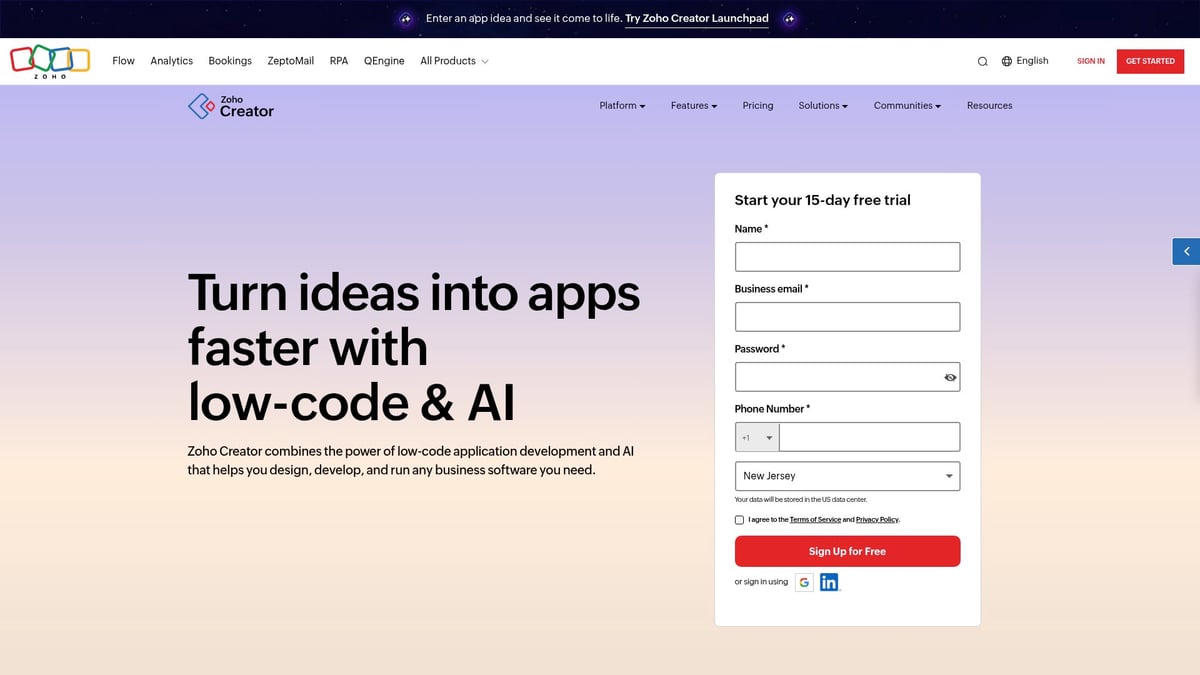
Key features include a drag-and-drop app builder, workflow automation, multi-platform deployment, and seamless integration with the Zoho suite. Zoho Creator empowers non-technical managers and business analysts to automate internal processes quickly.
Pros: it’s easy to use, budget-friendly, and fits perfectly into the Zoho ecosystem. Cons: there’s less flexibility for highly custom apps, and advanced programming options are limited.
A small business automated HR and CRM workflows in days using Zoho Creator, saving both time and administrative costs. For SMBs wanting accessible app dev software, Zoho Creator delivers practical results.
Mendix
Mendix brings enterprise-grade low-code capabilities to app dev software, making it a favorite for Agile teams and digital transformation projects. Pricing starts from $58 per user per month, with a free plan for small projects.

Mendix offers low-code development, cloud deployment, Agile project management, and AI-assisted features. Its built-in collaboration tools make it easy for teams to iterate rapidly and deliver new features.
The key benefits are rapid prototyping, iterative development, and strong support for Agile workflows. Pros are scalability, team collaboration, and robust integration. However, the higher entry cost and complexity may not suit smaller, simpler projects.
A large enterprise recently accelerated its digital transformation by building several internal apps on Mendix, reducing development cycles. For organizations needing scalable, collaborative app dev software, Mendix is a strong option.
Xcode
Xcode remains the gold standard app dev software for iOS and macOS developers. It’s free to use and offers seamless integration with the Apple ecosystem.

Xcode’s core features include a native code editor, Interface Builder, simulator, and integrated testing. It supports the latest Apple features, ensuring developers can leverage every new iOS/macOS release.
The main benefits are its completeness, up-to-date features, and strong debugging tools. However, it’s Mac-only and limited to Apple platforms, which can be a barrier for some teams.
Many top iOS apps are built and maintained with Xcode, benefiting from its reliability and depth. For teams focused on Apple platforms, this app dev software is indispensable.
Rierino
Rierino is a modern app dev software platform designed for enterprises and SaaS providers building complex, distributed solutions. Pricing is custom, with a free trial available.

Core features include a microservices architecture, API management, cloud-native deployment, and powerful automation. Rierino excels at enabling modular, scalable app development, making it ideal for teams creating microservices-based systems.
The main advantages are flexible deployment, modern architecture support, and strong automation. On the downside, it requires technical expertise and may be more than needed for small projects.
A SaaS provider recently used Rierino to launch a scalable, microservices-driven platform, highlighting its adaptability for complex needs. For large-scale, modular projects, this app dev software is a solid choice.
Studio Creatio
Studio Creatio is an app dev software solution built for enterprises needing low-code, AI-powered automation. Pricing starts at $25 per user per month, with a 14-day free trial.

Its core features include low-code development, AI automation, process modeling, and CRM integration. Studio Creatio accelerates app builds and automates business workflows, integrating smoothly with enterprise systems.
Key benefits are its AI features, process modeling, and CRM capabilities. Pros include rapid automation and enterprise integration, though pricing can increase as you scale. Onboarding may be required for non-technical users.
A company recently cut manual tasks by automating critical workflows with Studio Creatio, boosting productivity. For AI-driven, process-heavy projects, this app dev software is a powerful ally.
Rollbar
Rollbar is a specialized app dev software tool focused on real-time error monitoring and automated debugging. Pricing starts at $15.83 per month (billed annually), with a free trial available.
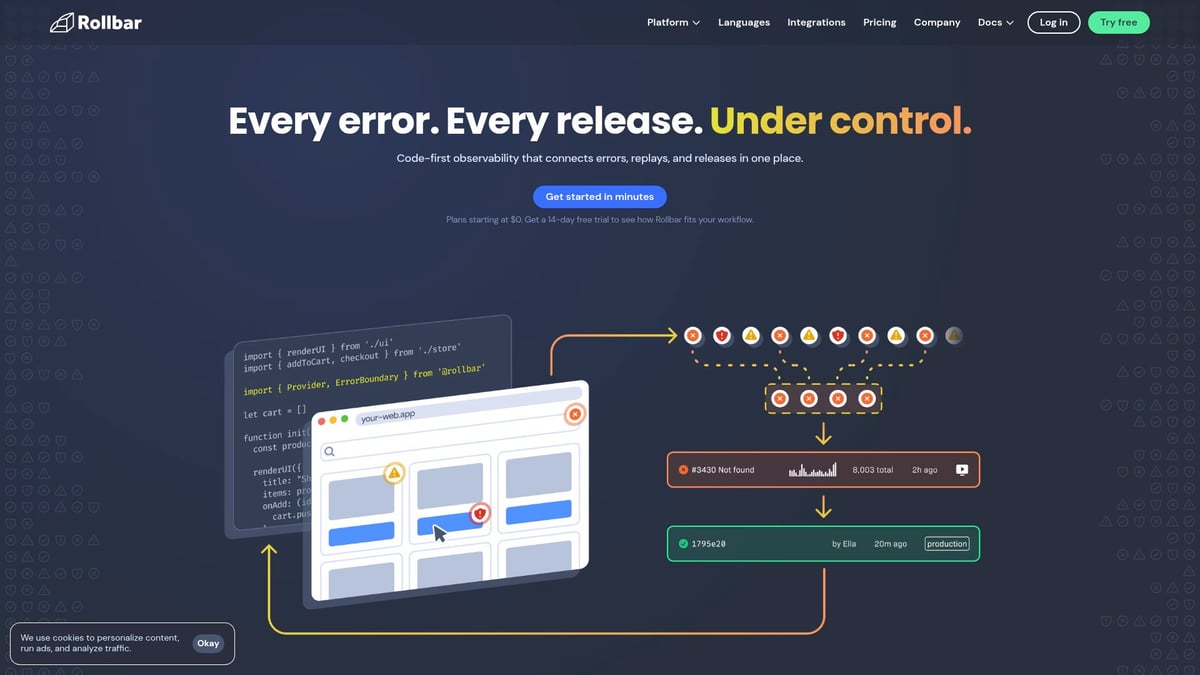
Core features include real-time bug tracking, automated debugging, and integrations with Slack, Jira, and GitHub. Rollbar helps teams identify and resolve issues quickly, improving app reliability and user experience.
The key benefits are detailed error reporting, actionable insights, and easy integration. Pros include automation and quality improvement, but it’s not a full development platform and is focused on monitoring.
A tech startup used Rollbar to reduce downtime and enhance user satisfaction by catching bugs before users noticed. For teams prioritizing quality in their app dev software stack, Rollbar is a must-have.
Appery.io
Appery.io is a versatile app dev software platform for fast mobile app prototyping. Pricing starts from $25 per month, with a 14-day free trial.
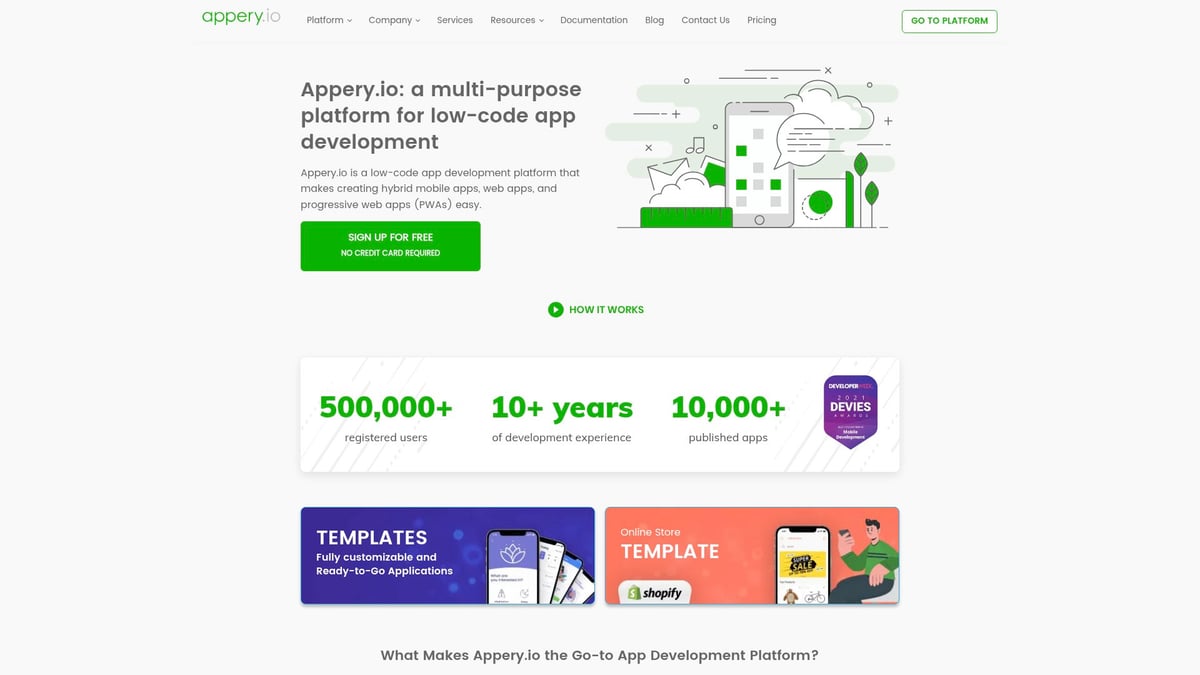
It combines low-code/no-code mobile app building with backend services, API integration, and cross-platform deployment. Appery.io is perfect for SMBs, agencies, and non-technical founders needing quick results.
Benefits include rapid prototyping, integrated backend, and support for web and hybrid apps. Pros are speed and all-in-one functionality, while cons are limited customization for complex projects and pricing that scales with usage.
An agency recently delivered a client-ready mobile app in record time using Appery.io, meeting tight deadlines with ease. For rapid, cross-platform mobile development, this app dev software delivers on speed and simplicity.
Key Features to Look for in App Dev Software Tools
Choosing the right app dev software in 2025 means looking beyond flashy marketing. The best tools combine speed, power, and flexibility, helping teams ship great products faster. Let’s break down the must-have features that separate leading platforms from the rest.
Drag and Drop, IDEs, and Automation Features
A standout app dev software platform should have a drag and drop builder for quick prototyping. This feature empowers both technical and nontechnical users to assemble interfaces and workflows visually, slashing development time.
Integrated development environments (IDEs) are another core aspect. With robust code editors, syntax highlighting, and error detection, IDEs allow developers to write, test, and debug code without switching tools. For those who need more insights into the landscape, Essential software development tools offers a deeper dive into what modern platforms provide.
Automation capabilities are vital. Look for AI-powered tools that automate repetitive tasks like code generation, testing, and deployment. These features boost productivity and reduce human error, making your team more efficient.
Collaboration, Security, and Integration Capabilities
Effective app dev software supports seamless collaboration. Features like real-time editing, version control, and project comments keep distributed teams aligned and productive.
Security and compliance are non-negotiable, especially for regulated industries. Top platforms offer role-based access, data encryption, and audit trails. Cloud-native deployment is now mainstream, with 90% of businesses incorporating cloud technology into their development processes. This shift means your app dev software should support secure cloud integration and easy scaling.
API and third-party integration support are equally important. The best platforms make it simple to connect with popular services, analytics, and payment gateways to extend your app’s reach and functionality.
Comparing Deployment Pipelines and Error Monitoring
Deployment automation is a key differentiator in app dev software. Leading platforms offer one-click deployment, continuous integration, and rollback options, ensuring your releases are fast and reliable.
Error monitoring and debugging tools are essential for maintaining high app quality. Real-time alerts, automated bug tracking, and actionable insights help teams catch issues before they impact users. When comparing platforms, look for built-in dashboards and notification systems that streamline troubleshooting.
Ultimately, the right mix of features in your app dev software can transform team workflows, reduce bottlenecks, and ensure a smoother path from idea to launch.
Maximizing ROI with the Right App Development Platform
Choosing the right app dev software can be the single most important factor in maximizing your return on investment. With the global software market projected to reach $1.9 trillion by 2025, the stakes for selecting the right tools have never been higher. The right platform helps teams rapidly prototype, iterate, and deploy applications, saving both time and money from day one.
Reducing Time and Cost with App Dev Software
App dev software streamlines repetitive tasks, automates testing, and simplifies deployment. By leveraging automation, teams can cut development cycles dramatically. This efficiency means fewer hours spent on manual coding and debugging, leading to substantial cost savings.
| Benefit | Impact on ROI |
|---|---|
| Faster prototyping | Quicker time to market |
| Automated QA/testing | Fewer post-launch issues |
| Scalable infrastructure | Lower maintenance costs |
When you select a platform tailored to your business needs, you gain a competitive edge while controlling costs.
Boosting Productivity and Quality
Modern app dev software enhances collaboration, especially for remote or distributed teams. Features like real-time editing and built-in version control empower everyone to contribute, regardless of technical background. Integrated QA and error monitoring tools help ensure higher app quality and better user experiences.
A startup, for example, used a low-code platform to move from MVP to a full-scale product quickly. If you want to understand the low-code vs. no-code differences in 2025, it's crucial for making the right choice.
Scaling Successfully: ROI Strategies
To maximize ROI, balance upfront investment with long-term scalability and maintenance. Pilot new app dev software with a small project before adopting it team-wide. This approach lets you gauge fit, identify training needs, and forecast future costs.
Prioritize platforms offering flexible pricing, robust support, and strong security. The right app dev software will empower your team to innovate, adapt, and grow with confidence.
After exploring the top app development tools for 2025, you’ve seen how the right platform can save you time, cut costs, and help you launch better products faster. Whether you’re a founder with a big idea or part of a team ready to move fast, getting your MVP off the ground quickly is key. If you’re curious how no code and AI can turn your vision into a real product—without the months of waiting—take the next step and Launch Your MVP in Weeks, Not Months.




About Big House
Big House is committed to 1) developing robust internal tools for enterprises, and 2) crafting minimum viable products (MVPs) that help startups and entrepreneurs bring their visions to life.
If you'd like to explore how we can build technology for you, get in touch. We'd be excited to discuss what you have in mind.
Other Articles
Learn how to add a custom domain to your Bubble app with step-by-step guides, SEO tips, and expert advice from Big House, a top no code agency specializing in Bubble.io development.
Discover the future of QA software development in 2025. Explore trends, tools, AI, best practices, and step-by-step strategies to ensure software excellence.
Unlock business growth in 2025 with this technological software guide Explore trends selection strategies integration tips and future proof your success

